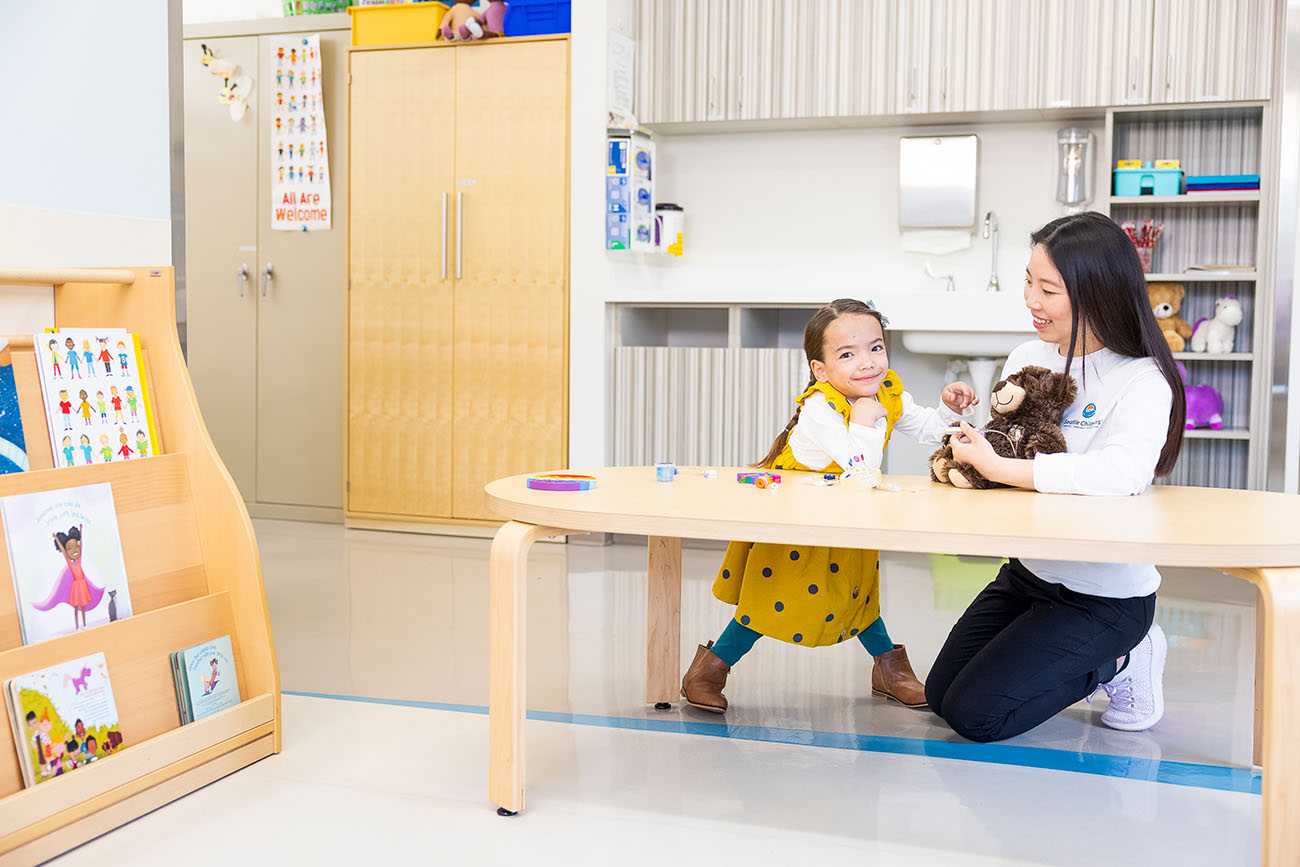Child Life Specialist Shares Tricks of the Trade to Help Kids Cope
11.19.24 | Heather Cooper
 It is hard enough for adults to navigate complex medical explanations and procedures; for children, it can feel impossible. That is where Seattle Children’s Child Life Department helps.
It is hard enough for adults to navigate complex medical explanations and procedures; for children, it can feel impossible. That is where Seattle Children’s Child Life Department helps.
Child Life specialists like Yifan Wang are specially trained to support the emotional, social and developmental needs of children during their visits to the hospital. Through play and education, Wang helps kids understand what to expect to maximize coping and minimize stress during procedures.
Wang says medical play is one of the most fun parts of being a Child Life specialist. Through role playing and storytelling with toys, and often real medical supplies, Wang helps patients gain a sense of control by creating an opportunity for children to ask questions and express feelings.
Read on to see how Wang helped one family receiving care at Seattle Children’s, then get tips to help your child or teen prepare for a medical procedure, from a needle poke to a surgery.
Meet Hailee
At just 3 years old, Hailee was diagnosed with a rare genetic disease that requires ongoing care, including multiple surgeries and weekly enzyme replacement therapy. For Hailee’s weekly therapy, doctors needed to place a port in her chest. Wang gave Hailee a Build-a-Bear and placed a port into the bear to show Hailee how it would appear and mimic how nurses would access it during treatment.
“One of the goals is to teach Hailee what's going to happen,” explains Wang. “The second is to help her feel like she isn’t going through it alone, that she has a stuffy buddy who's also going through it with her.”
Family-Centered Care
“We want to help the whole family, including siblings, cope with what's going on and truly keep that child and family-centered care at the heart of our support,” says Wang.
Like many siblings, Hailee’s brother, Jonah, struggled with the sudden shift in family dynamics. He was only 5 years old when Hailee was first diagnosed. Wang encouraged his parents to bring him to the hospital for a visit to see the clinic and meet the staff. It was a chance for him to learn about his sister’s treatments and understand what was happening when she was at appointments. Wang talked with Jonah, validated his feelings and helped him make sense of Hailee’s diagnosis.
Tips for Helping Kids and Teens Cope With Medical Procedures
 Whether a child or teen is having intense medical procedures or only faces occasional minor procedures, like vaccines and blood draws, Wang has tricks of the child life trade to share with parents and caregivers. You know your child best, so use the tips that will best support your child.
Whether a child or teen is having intense medical procedures or only faces occasional minor procedures, like vaccines and blood draws, Wang has tricks of the child life trade to share with parents and caregivers. You know your child best, so use the tips that will best support your child.
Before:
- Be honest about what your child or teen may experience, using words they can understand. Some kids like lots of detail about what they’ll see, hear and smell; others just want an overview.
- Provide reassurance, such as “I’ll be there as soon as you start to wake up,” or “you may feel a pinch, but it will be over quickly.”
- Tell your child’s healthcare provider in advance if you or your child are worried or anxious about the procedure. Together, you can make a plan to help your child feel the most comfortable.
- Help your child create a plan for what to bring with them and how to cope during the procedure. See “My Plan for Needles” for an example from Seattle Children’s.
- Have your child act out what will happen with their doll or stuffed animal.
- If your child will get care at Seattle Children’s, see if there’s “what to expect” information for your situation.
- Visit this book and resource list if preparing for a surgery or hospital stay at any healthcare facility.
During:
- Try to stay calm yourself. It may help to have another adult with you and your child if possible.
- Give your child or teen control where they can have control by giving choices, such as whether they watch or not, which arm gets poked, or what song to sing or play.
- Provide comfort. Depending on the procedure, babies might be able to be cuddled or fed; toddlers may sit on your lap and “blow away” pain; older kids might want to squeeze your hand.
- Let your child experience and express what is true for them during the procedure.
After:
- Comment on their successes and be specfic. For example, praise your child for holding still or using their coping plan. This can build their confidence.
“Through the power of play, education and therapeutic presence, as child life specialists, we strive every day to walk alongside families navigating difficult moments, and celebrate with them during the wins,” said Wang. “We always enjoy sharing tips that parents can use at home and in medical settings, too!”